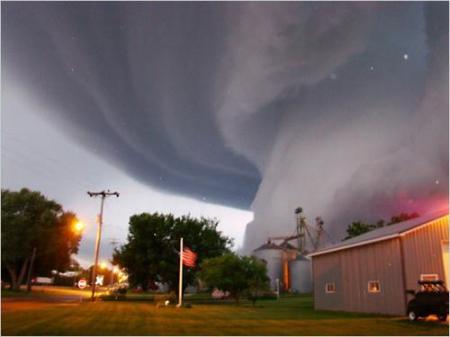Climate Change Weekly #28
A leaked copy of a United Nations Intergovernmental Panel on Climate Change (IPCC) report on extreme weather reveals a lack of evidence that global warming is causing extreme weather events, BBC News reports.
According to BBC News, the IPCC discussion of global warming and extreme weather events “contains a lot more unknowns than knowns.”
“[W]hen you get down to specifics, the academic consensus is far less certain,” BBC News reports. “There is ‘low confidence’ that tropical cyclones have become more frequent, ‘limited-to-medium evidence available’ to assess whether climatic factors have changed the frequency of floods, and ‘low confidence’ on a global scale even on whether the frequency has risen or fallen.”
“While it is ‘likely’ that anthropogenic influences are behind the changes in cold days and warm days, there is only ‘medium confidence’ that they are behind changes in extreme rainfall events, and ‘low confidence’ in attributing any changes in tropical cyclone activity to greenhouse gas emissions or anything else humanity has done,” according to BBC News.
BBC News notes the IPCC report explicitly holds back on making predictions about future extreme weather events.
Observes BBC News, “And for the future, the draft gives even less succour to those seeking here a new mandate for urgent action on greenhouse gas emissions, declaring: ‘Uncertainty in the sign of projected changes in climate extremes over the coming two to three decades is relatively large because climate change signals are expected to be relatively small compared to natural climate variability’.”
SOURCE: BBC News
IN THIS ISSUE
Australia to fine businesses for mentioning carbon tax costs … Singer critiques Berkeley papers … Gingrich admits Pelosi ad a ‘dumb’ mistake … WWF acknowledges growing polar bear population … Marine life not threatened by acidification … Hurricane fears overblown, studies show … ClimateWiki update
AUSTRALIA TO FINE BUSINESSES FOR MENTIONING CARBON TAX COSTS
The Australia Competition and Consumer Commission has warned businesses it will fine them up to $1.1 million if they tell consumers that any price increases are due to a recently enacted carbon tax. Businesses also will be fined if they advertise “pre-carbon tax” sale prices before the tax takes effect July 1.
SOURCE: The Telegraph
SINGER CRITIQUES BERKELEY PAPERS
Atmospheric scientist S. Fred Singer has published an article in American Thinker explaining why the Richard Muller/University of California, Berkeley temperature reconstructions do not support a global warming crisis.
SOURCE: American Thinker
GINGRICH ADMITS PELOSI AD A ‘DUMB’ MISTAKE
Republican presidential candidate Newt Gingrich has admitted his television ad with former House Speaker Nancy Pelosi was a big mistake and “probably the dumbest single thing I’ve done in years.” While sitting on a small couch with Pelosi in the ad, Gingrich said, “our country must take action to address climate change.”
SOURCE: The Hill
WWF ACKNOWLEDGES GROWING POLAR BEAR POPULATION
Norwegian polar bear populations are growing, the World Wildlife Fund is acknowledging. The primary reason appears to be a ban on hunting the iconic bears.
SOURCE: The Guardian
MARINE LIFE NOT THREATENED BY ACIDIFICATION
Brice Bosnich, emeritus professor of chemistry at the University of Chicago and visiting fellow at the Research School of Chemistry at the Australian National University, has posted a paper on Jo Nova’s Web site explaining why ocean acidification is not a serious global warming threat. Marine life has historically thrived in water with lower pH than current conditions, and only the most extreme acidification scenarios pose serious threats to marine life, Bosnich explains.
SOURCE: JoNova: Science, Climate, Carbon and Tax
HURRICANE FEARS OVERBLOWN, STUDIES SHOW
Global warming may lead to temperature changes in the North Atlantic Ocean that have a tendency to favor more and stronger tropical cyclones, but those same changes also will tend to direct the storms into the open Atlantic Ocean and away from the U.S. coast, a pair of new studies suggest. Consequently, the idea that global warming will “make hurricanes worse” is not as worrisome as it is often claimed, explains World Climate Report.
SOURCE: World Climate Report
CLIMATEWIKI UPDATE
The Heartland Institute has created a Web site, ClimateWiki.org, to help everyone – from high school students to scientists working in the field – quickly find the latest and most reliable information on climate science. Please send your questions, suggestions for new pages, or improvements to current ones to John Monaghan at [email protected]. And if you have new research to share, ClimateWiki.org is the perfect place.
An example from ClimateWiki, Iodocompounds, reads in part:
The climatic significance of iodinated compounds or iodocompounds was first described in the pages of Nature by O’Dowd et al. (2002). As related by Kolb (2002) in an accompanying perspective on their work, the 10-member research team discovered “a previously unrecognized source of aerosol particles” by unraveling “a photochemical phenomenon that occurs in sea air and produces aerosol particles composed largely of iodine oxides.”
Specifically, the team used a smog chamber operated under coastal atmospheric conditions to demonstrate, as they report, that “new particles can form from condensable iodine-containing vapors, which are the photolysis products of biogenic iodocarbons emitted from marine algae.” With the help of aerosol formation models, they also demonstrated that concentrations of condensable iodine-containing vapors over the open ocean “are sufficient to influence marine particle formation.”
If you have questions about the ClimateWiki or about The Heartland Institute, contact Jim Lakely, director of communications, at [email protected] or call 312/377-4000.





